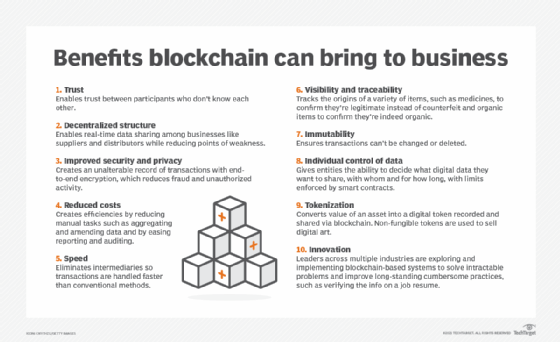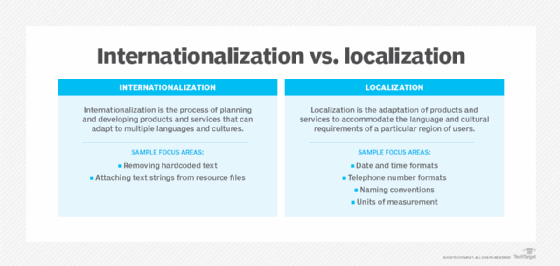globalization
What is globalization?
Globalization is the process by which ideas, knowledge, information, goods and services spread around the world. In business, the term is used in an economic context to describe integrated economies marked by free trade, the free flow of capital among countries and easy access to foreign resources, including labor markets, to maximize returns and benefit for the common good.
Globalization is driven by the convergence of cultural and economic systems. This convergence promotes -- and in some cases necessitates -- increased interaction, integration and interdependence among nations. The more countries and regions of the world become intertwined politically, culturally and economically, the more globalized the world becomes.
How globalization works
In a globalized economy, countries specialize in the products and services they have a competitive advantage in. This generally means what they can produce and provide most efficiently, with the least amount of resources, at a lower cost than competing nations. If all countries were specializing in what they do best, production should be more efficient worldwide, prices lower, economic growth widespread and all countries benefiting -- in theory.
Policies that promote free trade, open borders and international cooperation drive economic globalization. They enable international businesses to access lower priced raw materials and parts, take advantage of lower cost labor markets, and access larger and growing markets around the world in which to sell their goods and services.
Money, products, materials, information and people flow more swiftly across national boundaries than ever. Advances in technology enable and accelerate this flow and the resulting international interactions and dependencies. These technological advances have been especially pronounced in transportation and telecommunications.
Among the recent technological changes that have played a role in globalization are the following:
Internet and internet communication. The internet has increased the sharing and flow of information and knowledge, access to ideas and exchange of culture among people of different countries. It has contributed to closing the digital divide between more and less advanced countries.
Communication technology. The introduction of 4G and 5G technologies has dramatically increased the speed and responsiveness of mobile and wireless networks.

Internet of things and artificial intelligence. IoT and AI technologies are enabling the tracking of assets in transit and as they move across borders, making cross-border product management more efficient.
Blockchain. This technology provides a transparent ledger that centrally records and vets transactions in a way that prevents corruption and breaches. It facilitates the secure access to data required in industries such as healthcare and banking. It has also enabled the development of decentralized databases and storage that support the tracking of materials in the supply chain.

Transportation. Advances in air transport and fast rail technology have facilitated the movement of people and products. Changes in shipping logistics technology have made it possible to move raw materials, parts and finished products around the globe more efficiently.
Manufacturing. Advances in manufacturing, such as automation and 3D printing, have reduced geographic constraints in manufacturing. 3D printing enables digital designs to be sent anywhere and physically printed, making distributed, smaller-scale production near the point of consumption easier. Automation speeds up processes and supply chains, giving workforces more flexibility and improving output.
Why is globalization important?
Globalization changes the way nations, businesses and people interact. Specifically, it changes the nature of international economic activity, expanding trade, opening global supply chains and providing access to natural resources and labor markets.
Changing the way trade and financial exchange and interaction occur among nations also promotes the cultural exchange of ideas. It removes the barriers caused by geographic constraints, political boundaries and political economies.
For example, globalization enables businesses in one nation to access another nation's resources. More open access changes the way products are developed, supply chains are managed and organizations communicate. Businesses find cheaper raw materials and parts, less expensive or more skilled labor and more efficient ways to develop products.
With fewer restrictions on trade, globalization creates opportunities to expand. Increased trade promotes international competition. This, in turn, spurs innovation and, in some cases, the exchange of ideas and know-how. In addition, people coming from other nations to do business and work bring with them their own cultures, which influence and mix with other cultures.
The many types of exchange that globalization facilitates can have positive and negative effects. For instance, the exchange of people and goods across borders can bring fresh ideas and help business. However, this movement can also increase the spread of disease and promote ideas that might destabilize political economies.
For example, increased international trade and travel in the late 1990s led to West Nile Virus being introduced to North America, likely as a result of infected species being transported or people traveling there.
History of globalization
Although many people consider globalization a twentieth-century phenomenon, the process has been happening for millennia. Examples include the following:
- The Roman Empire. Going back to 600 B.C., the Roman Empire spread its economic and governing systems through significant portions of the ancient world for centuries.
- Silk Road trade. These trade routes, which date from 130 B.C. to 1453 A.D., represented another wave of globalization. They brought merchants, goods and travelers from China, through Central Asia and the Middle East, to Europe.
- Pre-World War I. European countries made significant investments overseas in the decades before World War I. The period from 1870 to 1914 is called the golden age of globalization.
- Post-World War II. The United States led the effort to create a global economic system with a set of broadly accepted international rules. Multinational institutions were established such as the United Nations, International Monetary Fund, World Bank and World Trade Organization to promote international cooperation and free trade.
The term globalization as it's used today came to prominence in the 1980s, reflecting several technological advancements that increased international interactions. IBM's introduction of the personal computer in 1981 and the subsequent evolution of the modern internet are two examples of technology that helped drive international communication, commerce and globalization.
Globalization has ebbed and flowed throughout history, with periods of expansion and retrenchment. The 21st century has witnessed both. Global stock markets plummeted after the Sept. 11, 2001, terrorist attacks in the United States, but rebounded in subsequent years.
More recently, nationalist political movements have slowed immigration, closed borders and increased trade protectionism. The pandemic had similar effects on borders and immigration, and it also disrupted supply chains. However, overall, the early 21st century has seen a dramatic increase in the pace of global integration. Rapid advances in technology and telecommunications are responsible for much of this change, according to economists.
What is the G20?
The G20, or Group of Twenty, is an international forum that aims to foster international cooperation by addressing global economic issues, such as financial stability and climate change. The G20 is made up of 19 countries and the European Union, including most of the world's largest economies.
The nations involved account for 80% of the planet's population, 75% of global exports and 85% of world GDP. It was founded in 1999, following the 1997 financial crisis, and has met every year since then.
Since 2008, the G20 has held an annual summit that brings together heads of state to discuss important economic issues. The G20's president is selected annually on a rotating basis, and that person's home country hosts the summit.
In 2021, the summit was held in Rome, Italy, and it addressed issues such as climate change, vaccines, taxes, the global economy and development aid. The 2022 summit was held in Bali, Indonesia. The main themes addressed were energy, governance, health, industrial development, economics and investment, as well as countering Russian aggression in Ukraine. The 2023 summit was held in New Delhi, India, with a focus on similar issues as well as an agreement to dramatically expand sustainable energy.
The members of G20 are Argentina, Australia, Brazil, Canada, China, France, Germany, Japan, India, Indonesia, Italy, Mexico, Russia, South Africa, Saudi Arabia, South Korea, Turkey, the United Kingdom, the United States, the European Union and the African Union. Spain is a permanent guest of the organization.
Types of globalization: Economic, political, cultural
There are three types of globalization.
- Economic globalization. This type of globalization focuses on the integration of international financial markets and the coordination of financial exchange. Free trade agreements, such as the North American Free Trade Agreement and the Trans-Pacific Partnership, are examples of economic globalization. Multinational corporations, which operate in two or more countries, play a large role in economic globalization.
- Political globalization. This type covers the national policies that bring countries together politically, economically and culturally. International organizations such as NATO and the United Nations are part of the political globalization effort.
- Cultural globalization. This aspect of globalization focuses in large part on the technological and societal factors that are causing cultures to converge. These include increased ease of communication, the pervasiveness of social media and access to faster and better transportation.
These three types of globalization influence one another. For example, liberalized national trade policies drive economic globalization. Political policies also affect cultural globalization, enabling people to communicate and move around the globe more freely. Economic globalization also affects cultural globalization through the import of goods and services that expose people to other cultures.
Effects of globalization
The effects of globalization can be felt locally and globally, touching the lives of individuals as well as the broader society in the following ways:
- Individuals. A variety of international influences affect ordinary people. Globalization can make it easier for people to access raw materials, products and services. It can also lower the prices they pay and their ability to travel to other countries.
- Communities. Globalization also changes how local and regional organizations, businesses and economies function and interact. It affects who lives in communities, where they work, who they work for, their ability to move out of their community and into one in another area, etc. Globalization also changes the way local cultures develop within communities.
- Institutions. Multinational corporations, national governments and other organizations such as colleges and universities are all affected by their country's approach to and acceptance of globalization. Globalization affects the ability of a company to grow and expand, a university's ability to diversify and grow its student body and a government's ability to pursue specific economic policies.
While the effects of globalization can be observed, analyzing the net impact is more complex. Proponents often see specific results as positive, and critics of globalization view the same results as negative or somewhat ineffective. A relationship that benefits one entity may damage another, and whether globalization benefits the world at large remains a point of contention.

Examples of globalization
Multinational corporations are a tangible example of globalization. Some examples include the following:
- McDonald's had more than 40,000 fast-food restaurants in 118 countries and territories in 2022.
- Ford Motor Company works with about 1,400 tier 1 suppliers around the globe.
- Amazon has expanded in recent years and now has nearly 10 million sellers globally and employs approximately 1.5 million employees.
Multinational corporations influence the social and economic development of the countries that host them. They also embody the contradictions of globalization. They bring jobs, skills and wealth to the region they're investing or doing business in. But they also can destroy local businesses, exploit cheap labor and threaten indigenous cultures. The benefits they offer are often unsustainable because the loyalty of multinationals is to their investors and bottom lines and not to the local people, economies and cultures where they're doing business.
Another example of globalization is the response to the COVID-19 pandemic. Because the world was able to communicate across boundaries, some nations worked together to quickly produce vaccines for the virus. In addition, doctors traveled where they were needed. For example, Cuba sent doctors to Italy at the beginning of the pandemic to assist with the crisis as it developed there.
However, countries also enacted strict travel restrictions, and many closed their borders to cut down on the free movement of people and spread of the virus.
Benefits of globalization
Globalization enables countries to access less expensive natural resources and lower cost labor. As a result, they can produce lower cost goods that can be sold globally. Proponents of globalization argue that a global economy improves the state of the world in many ways, such as the following:
- Solving economic problems. Globalization moves jobs and capital to places that need these resources. It gives more developed countries access to lower cost resources and labor, and less developed countries access to jobs and the investment funds they need for development.
- Promoting free trade. Globalization puts pressure on nations to reduce tariffs, subsidies and other barriers to free trade. This promotes economic growth, creates jobs, makes companies more competitive and lowers prices for consumers.
- Spurring economic development. Globalization can give developing countries access to foreign capital and technology they wouldn't otherwise have, thus bridging the digital divide. Foreign investment can result in an improved standard of living for the citizens of those nations.
- Encouraging positive trends in human rights and the environment. Advocates of globalization point to improved attention to human rights on a global scale and a shared understanding of the impact of people and production on the environment.
- Promoting shared cultural understanding. Advocates view the increased ability to travel and experience new cultures as a positive part of globalization that can contribute to international cooperation and peace.
Negative consequences of globalization
Many proponents view globalization as a way to solve systemic problems in the world economy, but critics see it as increasing global income inequality. Among the critiques of globalization are the following issues:
- Destabilizes markets. Critics of globalization blame the elimination of trade barriers and the freer movement of people for undermining national policies and local cultures. Labor markets in particular are affected when people move across borders in search of higher paying jobs and companies outsource work and jobs to lower cost labor markets.
- Damages the environment. The transport of goods and people among nations generates greenhouse gases and all the negative effects it has on the environment. Global travel and trade also can introduce, sometimes inadvertently, invasive species to foreign ecosystems. Industries such as fishing and logging tend to go where business is most lucrative or the regulatory environment is less restrictive, which has resulted in overfishing and deforestation in some parts of the world.
- Lowers living standards. When companies move operations overseas to minimize costs, such moves can eliminate jobs, increasing unemployment in sectors of the home country.
- Facilitates global recessions. Tightly integrated global markets carry a greater risk of global recessions. The 2007-2009 financial crisis and Great Recession is a good example of how intertwined global markets are and how financial problems in one country or region can quickly affect other parts of the world. Globalization reduces the ability of individual nations to use monetary and fiscal policies to control the national economy.
- Damages cultural identities. Critics of globalization decry the decimation of unique cultural identities and languages that comes with the international movement of businesses and people. At the same time, the internet and social media are driving this trend even without the movement of people and commerce.
- Increases the likelihood of pandemics. Increased travel has the potential to increase the risk of pandemics. The H1N1 swine flu outbreak of 2009 and coronavirus in 2020 and 2021 are two examples of serious diseases that spread to multiple nations quickly.
Examples of deglobalization
Globalization critics promote deglobalization, where nations are skeptical of global integration. Independence, particularly economic independence, is viewed as more beneficial than interdependence on other nations.
For example, the COVID-19 pandemic's effect on global supply chains caused bottlenecks and shortages of many goods, straining various nations' economies. To proponents of deglobalization, a shift toward locally sourced raw materials and products made sense.
However, it's not just countries that are becoming deglobalized. Companies are disengaging from certain countries, as well. Many companies closed their offices in Russia and suspended service in light of the Russia-Ukraine war. Others have partially ceased operations there, as Sketchers did in suspending shipments to Russia but not online sales.
In recent decades, companies in certain sectors -- particularly manufacturing -- have outsourced operations to other countries to take advantage of lower labor costs. More recently, there have been targeted efforts to reduce reliance on countries like China and reshore U.S. manufacturing so that products can be sourced in the U.S. For example, Intel is building two semiconductor plants in central Ohio, and Hyundai is building an electric vehicle and battery manufacturing plant in Georgia.
Future of globalization
Technological advances, particularly in blockchain, mobile communication and banking, are fueling economic globalization.
Nonetheless, rising levels of protectionism and antiglobalization sentiment could slow or even reverse the rapid pace of globalization. Nationalism and increasing trends toward conservative economic policies are driving these antiglobalization efforts.
Global trade is also made more difficult by rising threats from other factors, such as the following:
- Climate change.
- Decaying infrastructure.
- Cyber attacks.
- Human rights abuses.
The takeaway
Globalization is a longstanding trend that's in the process of changing and possibly slowing. There are advantages to the open border and free trade that globalization promotes, especially with technological advancements that facilitate international trade, in terms of both imports and exports. There are also negative consequences.
In the post-pandemic world, individuals, businesses and countries must consider both sides of the globalization issue. The fact that there are pros and cons to consider is shaping how companies are rethinking global supply chains to avoid disruption while still reaping some benefits of globalization.
Globalized supply chains can slow down due to component supply issues or shrinking demand. Find out how the recent decline in global smartphone shipments exemplifies this.







